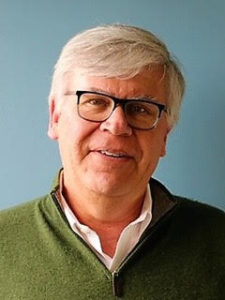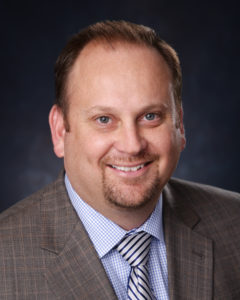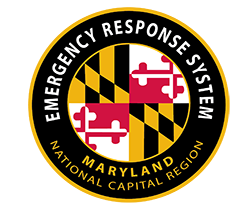Please join the Maryland-National Capital Region Emergency Response System and community partners as we reimagine public safety and homeland security in this ever evolving threat environment.
Specific topics that will be covered:
- Pandemic Response
- Cyber Threats to Public Safety
- Climate Change and the Impact to Critical Infrastructure
- Rising Violent Extremism

Event Details
Dates: Wednesday, April 28, 2021 & Thursday, April 29, 2021
Featured Speakers!
 Mr. John C. (Chris) Inglis currently serves as the current U. S. Naval Academy Looker Distinguished Visiting Professor for Cyber Studies. He retired from the Department of Defense in January 2014 after 41 years of federal service, including 28 years at NSA and seven and a half years as its Deputy Director. He is a managing director at Paladin Capital, a trustee of the National Intelligence University, a member of the Boards of FedEx and Huntington Bank, and a Commissioner on the US Cyberspace Solarium Commission.
Mr. John C. (Chris) Inglis currently serves as the current U. S. Naval Academy Looker Distinguished Visiting Professor for Cyber Studies. He retired from the Department of Defense in January 2014 after 41 years of federal service, including 28 years at NSA and seven and a half years as its Deputy Director. He is a managing director at Paladin Capital, a trustee of the National Intelligence University, a member of the Boards of FedEx and Huntington Bank, and a Commissioner on the US Cyberspace Solarium Commission.
Mr. Inglis holds advanced degrees in engineering and computer science from Columbia University, Johns Hopkins University, and the George Washington University. Mr. Inglis’ military career includes 30 years of service in the US Air Force and Air National Guard — from which he retired as a Brigadier General. He holds the rating of Command Pilot.
 Dr. Amesh Adalja is a Senior Scholar at the Johns Hopkins Center for Health Security, an Adjunct Assistant Professor at the Johns Hopkins Bloomberg School of Public Health, and an Affiliate of the Johns Hopkins Center for Global Health. His work is focused on emerging infectious disease, pandemic preparedness, and biosecurity.
Dr. Amesh Adalja is a Senior Scholar at the Johns Hopkins Center for Health Security, an Adjunct Assistant Professor at the Johns Hopkins Bloomberg School of Public Health, and an Affiliate of the Johns Hopkins Center for Global Health. His work is focused on emerging infectious disease, pandemic preparedness, and biosecurity.
Dr. Adalja has served on US government panels tasked with developing guidelines for the treatment of plague, botulism, and anthrax in mass casualty settings and for the system of care for infectious disease emergencies. He also served as an external advisor to the New York City Health + Hospitals Emergency Management Highly Infectious Disease training program and on a US Federal Emergency Management Agency working group on nuclear disaster recovery. He is a spokesperson for the Infectious Diseases Society of America; he previously served on their public health and diagnostics committees and their precision medicine working group. Dr. Adalja is a member of the American College of Emergency Physicians Pennsylvania Chapter’s EMS & Terrorism and Disaster Preparedness Committee as well as the Allegheny County Medical Reserve Corps. He was formerly a member of the National Quality Forum Infectious Disease Standing Committee, where he currently serves on the Primary Care and Chronic Illness Standing Committee, and the US Department of Health and Human Services National Disaster Medical System, with which he was deployed to Haiti after the 2010 earthquake and was also selected for their mobile acute care strike team. Dr. Adalja’s expertise is frequently sought by international and national media.
During the COVID-19 pandemic, Dr. Adalja has served as a member of the National Collegiate Athletic Association coronavirus advisory group; a consultant to various businesses, schools, and organizations; and an informal advisor to the International Monetary Fund.
Dr. Adalja is an Associate Editor of the journal Health Security. He was a coeditor of the volume Global Catastrophic Biological Risks and a contributing author for the Handbook of Bioterrorism and Disaster Medicine, the Emergency Medicine CorePendium, Clinical Microbiology Made Ridiculously Simple, UpToDate’s section on biological terrorism, and a North Atlantic Treaty Organization volume on bioterrorism. He has also published in such journals as the New England Journal of Medicine, JAMA, Journal of Infectious Diseases, Clinical Infectious Diseases, Emerging Infectious Diseases, Annals of Emergency Medicine, and Health Security.
Dr. Adalja is a Fellow of the Infectious Diseases Society of America, the American College of Physicians, and the American College of Emergency Physicians. He is a member of various medical societies, including the American Medical Association, the HIV Medicine Association, and the Society of Critical Care Medicine. He is a board-certified physician in internal medicine, emergency medicine, infectious diseases, and critical care medicine.
Dr. Adalja completed 2 fellowships at the University of Pittsburgh—one in infectious diseases, for which he served as chief fellow, and one in critical care medicine. Prior to that he completed a combined residency in internal medicine and emergency medicine at Allegheny General Hospital in Pittsburgh, where he served as chief resident and as a member of the infection control committee. He was a Clinical Assistant Professor at the University of Pittsburgh School of Medicine from 2010 through 2017 and is currently an Adjunct Assistant Professor there. He is also an Adjunct Assistant Professor in the Department of Biological Sciences at Carnegie Mellon University.
He received an MD from the American University of the Caribbean School of Medicine and a BS in industrial management from Carnegie Mellon University.
Dr. Adalja is a native of Butler, Pennsylvania, and actively practices infectious disease, critical care, and emergency medicine in the Pittsburgh metropolitan area, where he was appointed to the City of Pittsburgh’s HIV Commission and the advisory group of AIDS Free Pittsburgh.
 Gerrit Bakker is the Senior Director for Public Health Preparedness at the Association of State and Territorial Health Officials (ASTHO). He has primary responsibility for the preparedness program where he serves as the principal representative to federal, state, local and non-governmental partners. While at ASTHO he has helped direct ASTHO’s response to diverse events such as the Deep Water Horizon Oil Spill, Domestic Ebola, Zika virus and COVID-19. Gerrit came to ASTHO in 2010 following 27 years of public health service in Colorado.
Gerrit Bakker is the Senior Director for Public Health Preparedness at the Association of State and Territorial Health Officials (ASTHO). He has primary responsibility for the preparedness program where he serves as the principal representative to federal, state, local and non-governmental partners. While at ASTHO he has helped direct ASTHO’s response to diverse events such as the Deep Water Horizon Oil Spill, Domestic Ebola, Zika virus and COVID-19. Gerrit came to ASTHO in 2010 following 27 years of public health service in Colorado.
Gerrit served the Colorado Department of Public Health and Environment in many capacities, including directing the Immunization Program and the Viral Hepatitis Program. Gerrit also served as the Deputy Director for the Emergency Preparedness and Response Division where he was the ESF-8 lead during emergency activations including the 2008 Democratic National Convention. Gerrit is a graduate of the University of Iowa, the Rocky Mountain Regional Institute for Health and Environmental Leadership, the Harvard University National Preparedness Leadership Initiative and the Naval Postgraduate School Center for Homeland Security and Defense. Gerrit also received the Roy Cleere Distinguished Service Award for exceptional contributions to public health in Colorado.
 Dr. Bob Bollinger is the Raj and Kamla Gupta Professor of Infectious Diseases at the Johns Hopkins University (JHU) School of Medicine, and he holds joint appointments in International Health at the Johns Hopkins (JH) Bloomberg School of Public Health, and in Community Public Health at the JH School of Nursing. He is Founding Director of the Center for Clinical Global Health Education (CCGHE) and Associate Director for Medicine of the Johns Hopkins Center for Global Health. Dr. Bollinger has been on the faculty at Johns Hopkins School of Medicine for 29 years, where he has been an educator, researcher and clinician. He is board certified by the American Board of Internal Medicine in internal medicine and infectious diseases. He has more than 40 years of experience in international public health, clinical research, and education dealing with such global health priorities as HIV/AIDS, malaria, tuberculosis, leprosy, dengue, antibiotic resistant infections, COVID-19 and other emerging diseases. Much of his research has focused on development of low-cost strategies and technologies designed to improve health care, treatment and prevention in resource-limited communities.
Dr. Bob Bollinger is the Raj and Kamla Gupta Professor of Infectious Diseases at the Johns Hopkins University (JHU) School of Medicine, and he holds joint appointments in International Health at the Johns Hopkins (JH) Bloomberg School of Public Health, and in Community Public Health at the JH School of Nursing. He is Founding Director of the Center for Clinical Global Health Education (CCGHE) and Associate Director for Medicine of the Johns Hopkins Center for Global Health. Dr. Bollinger has been on the faculty at Johns Hopkins School of Medicine for 29 years, where he has been an educator, researcher and clinician. He is board certified by the American Board of Internal Medicine in internal medicine and infectious diseases. He has more than 40 years of experience in international public health, clinical research, and education dealing with such global health priorities as HIV/AIDS, malaria, tuberculosis, leprosy, dengue, antibiotic resistant infections, COVID-19 and other emerging diseases. Much of his research has focused on development of low-cost strategies and technologies designed to improve health care, treatment and prevention in resource-limited communities.
Dr. Bollinger has been a supporter, mentor and consultant for many strategic Hopkins initiatives that prioritize access to low-cost diagnostics for resource-limited communities, including the IDEA (Innovation + Design Enabling Access) Initiative, the CBID (Center for Bioengineering Innovation and Design) and the CIDID (Center for Innovative Diagnostics in Infectious Diseases). He is also member of the Johns Hopkins Precision Medicine Center of Excellence for COVID-19, which is developing novel data analytics tools and risk prediction models to improve the care of patients infected with SARS-CoV-2. Dr. Bollinger has also led two successful Hopkins public-private partnerships that have developed innovative technologies designed to improved diagnosis and patient care (See Disclosure below). In 2014, emocha HEALTH© Inc licensed mobile health technology from JHU that was developed by Dr. Bollinger and his Hopkins colleagues. emocha HEALTH© is now a digital health leader in the area of medication adherence and has also recently supported COVID-19 diagnosis, contact tracing, symptom monitoring, return-to-work and return-to-learn programs throughout the US. From 2013-2018, Dr. Bollinger was also founding inventor and Director of the Johns Hopkins miLab Program focused on development of novel, low-cost point-of-care (POC) diagnostics, leveraging a partnership between JHU biomedical scientists and silicon microchip engineers at imec in Leuven, Belgium. In 2015, the miLAB program led to the launch of a joint commercial venture between JHU, imec and private investors in Belgium (miDiagnostics). From 2015-18, under Dr. Bollinger’s leadership, the miLAB research program at JHU generated 17 new IP disclosures and multiple patents, supporting the development of 4 point-of-care diagnostic platforms (cell-free imaging, nucleic acid detection, protein detection and biochemical assays).
Dr. Bollinger has received the Johns Hopkins Department of Medicine David M. Levine Excellence in Mentoring Award and is author of more than 200 peer-reviewed research publications and 15 book chapters. He has served as a member of the US Presidential Advisory Council for HIV/AIDS (PACHA), a member of the Institute of Medicine Forum on Public-Private Partnerships for Global Health and Safety and as a member of the NIH Fogarty International Center Advisory Board. He is also currently a member of the CURE Drug Repurposing Collaboratory (CDRC) Advisory Committee, which is establishing global clinical data and analysis partnerships to identify potential treatments for infectious diseases, including COVID-19.
Dr. Bollinger received an undergraduate degree in Philosophy and Chemistry from Haverford College, a Doctor of Medicine from Dartmouth Medical School, and a Master of Public Health from Johns Hopkins Bloomberg School of Public Health. He completed his internal medicine training at the University of Maryland Medical Systems, followed by a post-doctoral fellowship in infectious diseases at JHU School of Medicine.
Disclosure. The Johns Hopkins University has a financial interest in emocha and miDiagnostics. These companies have licensed technology that was invented at the Johns Hopkins University. This financial interest includes equity in the company and entitlement to royalties. Dr. Bollinger is an inventor of these technologies. He has equity and a royalty interest in emocha and miDiagnostics. He is a member of the emocha Board of Directors and is a consultant to the company. These conflicts of interest are being managed by the University in accordance with its conflict-of-interest policies.
 Dr. Cameron Carlson serves as Program Director for the Homeland Security and Emergency Management (HSEM) undergraduate and graduate programs as well as Director of the Center for Arctic Security and Resilience (CASR) at the University of Alaska Fairbanks. As the Director of the HSEM program for the past ten years, Cam has focused on redefining homeland defense, security and emergency management education and in developing collaborative working relationships with other programs within the U.S. and abroad to better meet the needs of the diverse student populations across the spectrum of these fields. He currently serves as the Project lead/PI for the Arctic Defense Security Orientation (ADSO) project for USNORTHCOM/USALCOM and is working to integrate interdisciplinary research and academic activities to focus on areas such as GEOINT integration, climate security and resilience and human security within the Arctic region.
Dr. Cameron Carlson serves as Program Director for the Homeland Security and Emergency Management (HSEM) undergraduate and graduate programs as well as Director of the Center for Arctic Security and Resilience (CASR) at the University of Alaska Fairbanks. As the Director of the HSEM program for the past ten years, Cam has focused on redefining homeland defense, security and emergency management education and in developing collaborative working relationships with other programs within the U.S. and abroad to better meet the needs of the diverse student populations across the spectrum of these fields. He currently serves as the Project lead/PI for the Arctic Defense Security Orientation (ADSO) project for USNORTHCOM/USALCOM and is working to integrate interdisciplinary research and academic activities to focus on areas such as GEOINT integration, climate security and resilience and human security within the Arctic region. Dr. John Comiskey is an Associate Professor of Homeland Security at Monmouth University in West Long Branch, New Jersey. He teaches undergraduate and graduate courses in homeland security, intelligence, terrorism, climate security, and mass shootings. Dr. Comiskey’s research interests include homeland security intelligence, cyber security, mass shootings, and climate security. He is the coeditor of Theoretical Foundations of Homeland Security and has published peer reviewed journal articles in the Homeland Security Affairs, Journal of Homeland Security Education, Journal of Human Security and Resilience, Disaster Journal, and Behavioral & Social Science Librarian journals as well as several U.S. government White Papers. Dr. Comiskey is the editor of the Journal of Security, Intelligence, and Preparedness Education.
Dr. John Comiskey is an Associate Professor of Homeland Security at Monmouth University in West Long Branch, New Jersey. He teaches undergraduate and graduate courses in homeland security, intelligence, terrorism, climate security, and mass shootings. Dr. Comiskey’s research interests include homeland security intelligence, cyber security, mass shootings, and climate security. He is the coeditor of Theoretical Foundations of Homeland Security and has published peer reviewed journal articles in the Homeland Security Affairs, Journal of Homeland Security Education, Journal of Human Security and Resilience, Disaster Journal, and Behavioral & Social Science Librarian journals as well as several U.S. government White Papers. Dr. Comiskey is the editor of the Journal of Security, Intelligence, and Preparedness Education.
Dr. Comiskey is a retired New York City Police Lieutenant and a retired U.S. Coast Guard Reserve Senior Chief Petty Officer. His professional experiences include law enforcement, intelligence, counterterrorism, and event and crisis management. Dr. Comiskey was a first-responder to both the 1993 and 2001 World Trade Center bombings and returned to active duty with the U.S. Coast Guard during Operation Iraqi Freedom.
 John Tully Gordon is an Intelligence Research Specialist with the NYPD Intelligence Bureau where he serves as the Team Leader for the Global Trends and Developments unit. The team is responsible for providing timely, accurate, and actionable intelligence analysis for both the NYPD’s Intelligence and Counterterrorism Bureaus on a wide range of national security issues and terrorism-related threats.
John Tully Gordon is an Intelligence Research Specialist with the NYPD Intelligence Bureau where he serves as the Team Leader for the Global Trends and Developments unit. The team is responsible for providing timely, accurate, and actionable intelligence analysis for both the NYPD’s Intelligence and Counterterrorism Bureaus on a wide range of national security issues and terrorism-related threats.
John received his B.A. from Fordham University in International Political Economy in 2010. He earned his M.A. in Political Science at Fordham University where he completed a thesis, The Scourge of the Sahel: Examining the Rise of Boko Haram and Modern Violent Extremism in West Africa in 2014. He earned a M.S. in Security Studies concentrating in Homeland Security in 2016 from the U.S. Naval Postgraduate School’s Center for Homeland Defense and Security where he authored a thesis, Redirected Radicals: Understanding the Risk of Altered Targeting Trajectories among ISIL’s Aspiring Foreign Fighters. John was awarded an Urban Fellowship from the City of New York in 2010 and began working for the NYPD later that year. He previously worked at the National September 11th Memorial and Museum at the World Trade Center.
 Gigi Kwik Gronvall, PhD is a Senior Scholar at the Johns Hopkins Center for Health Security, in the Johns Hopkins Bloomberg School of Public Health. She is an immunologist by training, leading the Center’s efforts to track the development of COVID-19 diagnostic and serology tests. Dr. Gronvall is the author of the book Synthetic Biology: Safety, Security, and Promise (2016) and Preparing for Bioterrorism: The Alfred P. Sloan Foundation’s Leadership in Biosecurity (2013). She is also a member of advisory committees to the NIH Director and to the US Secretary of Defense.
Gigi Kwik Gronvall, PhD is a Senior Scholar at the Johns Hopkins Center for Health Security, in the Johns Hopkins Bloomberg School of Public Health. She is an immunologist by training, leading the Center’s efforts to track the development of COVID-19 diagnostic and serology tests. Dr. Gronvall is the author of the book Synthetic Biology: Safety, Security, and Promise (2016) and Preparing for Bioterrorism: The Alfred P. Sloan Foundation’s Leadership in Biosecurity (2013). She is also a member of advisory committees to the NIH Director and to the US Secretary of Defense. Dr. Michael D. Larrañaga, PhD, PE, CIH, FAIHA
Dr. Michael D. Larrañaga, PhD, PE, CIH, FAIHAis President of R.E.M. Risk Consultants (
www.remrisk.com
), a comprehensive environmental, safety, and health consulting firm with experience in strategic decision-making, risk management, business continuity, and operational excellence. Dr. Larrañaga is co-founded and pilotedthe Advanced Thinking in Homeland Security think tank at the United States Naval Postgraduate School’s (NPS) Center for Homeland Defense and Security and is an appointed member of the Scientific/Technical Advisory Committee of the World Trade Center Health Program (formerly the 9/11Medical Monitoring Program) of the Centers for Disease Control and Prevention (CDC) and the Department of Homeland Security (DHS) Opioid Working Group. He previously served as an appointed public member on the Board of Scientific Counselors for the CDC’s National Institute for Occupational Safety and Health and the DHS First Responders Group. Previously, Dr. Larrañaga was Simplex Professor and Department Head of the School of Fire Protection and Safety at Oklahoma State University (OSU).
 Markus Rauschecker, JD is the Cybersecurity Program Director at the University of Maryland Center for Health and Homeland Security (CHHS) and an Adjunct Faculty member at the University of Maryland Carey School of Law. In his role, Markus focuses on legal and policy issues in cybersecurity. He works with government agencies and the private sector to increase their understanding of the many legal and policy issues they face in cybersecurity. Through CHHS,
Markus Rauschecker, JD is the Cybersecurity Program Director at the University of Maryland Center for Health and Homeland Security (CHHS) and an Adjunct Faculty member at the University of Maryland Carey School of Law. In his role, Markus focuses on legal and policy issues in cybersecurity. He works with government agencies and the private sector to increase their understanding of the many legal and policy issues they face in cybersecurity. Through CHHS,
Markus supports clients with planning, training, and exercises to enable them to better prepare and respond to cyber incidents. Markus also serves by appointment of the Maryland Attorney General on the Maryland Cybersecurity Council. Markus chairs the Council’s Critical Infrastructure Subcommittee, which addresses critical infrastructure cybersecurity in Maryland. He is also a member of the Council’s Legislative Subcommittee which makes recommendations on state legislation related to cybersecurity and data privacy.
Markus has developed and teaches three courses at the University of Maryland Carey School of Law: The “Law and Policy of Cybersecurity,” “Cybercrimes,” and “International Law and Cybersecurity.” These core courses are part of the School’s Cybersecurity and Crisis Management Law program which prepares future lawyers to help their clients with the significant cybersecurity challenges they face. Markus believes strongly in educating stakeholders about cyber security issues and regularly speaks at conferences, seminars, and small business events.
 Sana Saleh, is a Senior Strategic Advisor at CISA, focused on bridging lexicons, disciplines, finessing strategic communications among key stakeholders, and advising leadership and the C-suite. A lawyer by background, Sana began her Federal career as Special Advisor to the Army General Counsel, focused on legal and policy advice to the Secretary of the Army. From there she became Special Advisor to the Army Secretary. She initiated and managed the first Cyber Policy portfolio for the Office of the Secretary of the Army—engaging the Pentagon’s Four Star leadership, NATO allies, institutions, and other stakeholders on issues ranging from the internet of things (IoT) to cyber warfare/weaponry. She was then recruited to serve as Senior Advisor in the Office of the Secretary of Defense, proposing and implementing detailed recommendations, DoD-wide strategic initiatives, and reforms which were adopted, as written, by the Secretary of Defense and Deputy Secretary of Defense.
Sana Saleh, is a Senior Strategic Advisor at CISA, focused on bridging lexicons, disciplines, finessing strategic communications among key stakeholders, and advising leadership and the C-suite. A lawyer by background, Sana began her Federal career as Special Advisor to the Army General Counsel, focused on legal and policy advice to the Secretary of the Army. From there she became Special Advisor to the Army Secretary. She initiated and managed the first Cyber Policy portfolio for the Office of the Secretary of the Army—engaging the Pentagon’s Four Star leadership, NATO allies, institutions, and other stakeholders on issues ranging from the internet of things (IoT) to cyber warfare/weaponry. She was then recruited to serve as Senior Advisor in the Office of the Secretary of Defense, proposing and implementing detailed recommendations, DoD-wide strategic initiatives, and reforms which were adopted, as written, by the Secretary of Defense and Deputy Secretary of Defense.
Just ahead of onboarding with CISA, Sana loaned her national security, cyber policy, strategic development, legal, and management consulting expertise to FEMA as an onsite Director for contracting staff; projects spearheaded included writing the National Investment Strategy for DHS Grants; evaluating the cyber maturity of SLTTs’ Cyber Investment Proposals/Justifications; emergency/continuity communications; and leading target-hardening nonprofit security projects stemming from the recent rash of incidents at houses of worship.
Sana is an evening professor of Cyber Intel/Statecraft and cyber law at the Institute of World Politics. She is routinely invited to leverage her diverse expertise/experiences to speak at beltway think tanks, state-side or overseas universities like Oxford, the UN, or NATO allies. She also hosts Chatham House “Cyber Salons” in the beltway featuring spirited, multidisciplinary debates among various cyber professionals. In her off-time, Sana enjoys shooting hoops, foodie outings, fostering animals, and watching films.
 Netta Squires JD, MSL, CEM, is a cybersecurity, emergency management, and legal practitioner and educator. Netta works as a Senior Law and Policy Analyst for the University of Maryland Baltimore Carey School of Law, Center for Health and Homeland Security. As a specialist in emergency preparedness and response,
Netta Squires JD, MSL, CEM, is a cybersecurity, emergency management, and legal practitioner and educator. Netta works as a Senior Law and Policy Analyst for the University of Maryland Baltimore Carey School of Law, Center for Health and Homeland Security. As a specialist in emergency preparedness and response,
Netta is contracted out to Montgomery County Office of Emergency Management and Homeland Security (OEMHS), where she specializes in emergency planning, training, and exercising for the County and the National Capitol Region, and serves as a subject matter expert on cybersecurity planning. She is also an Adjunct Professor at the University of Maryland Global Campus in the Cybersecurity Technology graduate program, and at the Mid-Atlantic Center for Emergency Management at Frederick Community College in the Emergency Management and Criminal Justice Programs. She is a Certified Emergency Manager by the International Association of Emergency Management.
Netta strongly believes in bolstering cybersecurity preparedness through integration of emergency management concepts, practice, and tools. As a practitioner she emphasizes bridging the gap between IT and cybersecurity policymakers, and is a proponent of teaching these concepts and methods early on in Emergency Management and Cybersecurity academic programs. Netta co-led writing Montgomery County’s Cybersecurity Incident Response Plan and leads the Cybersecurity consequence management planning for the office. In addition, she has worked on legislative efforts to secure cybersecurity measures for election security.

